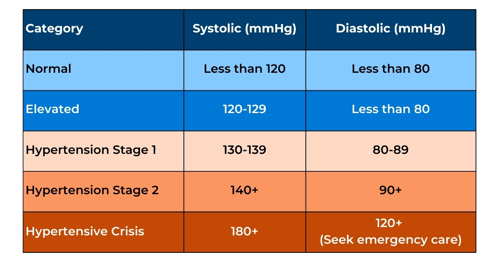Hypertension in Seniors: Causes, Risks, and Proven Ways to Lower Blood Pressure
By Dr. Sunny Ramchandani, President of Flagship Medical Group
Our bodies undergo various changes as we age, and with those changes come new health challenges. Hypertension, or high blood pressure, is one of the most common yet often overlooked conditions affecting seniors today. It is a leading cause of heart disease, stroke, kidney disease, and cognitive decline.
Here's the good news: hypertension is manageable and, in many cases, preventable.
This article explores what hypertension is, why it matters, and, most importantly, practical steps to lower blood pressure and improve overall health.
What is Hypertension?
Hypertension occurs when the force of blood against the artery walls remains consistently high, putting strain on your heart and blood vessels. Over time, this increased pressure can damage arteries, leading to serious complications such as heart attacks, strokes, and kidney disease. Blood pressure is measured in millimeters of mercury (mmHg) and recorded as two numbers:
- Systolic Pressure (Top Number) – The force of blood in your arteries when your heart beats.
- Diastolic Pressure (Bottom Number) – The force of blood in your arteries between heartbeats.
Blood Pressure Categories

According to the Centers for Disease Control and Prevention (CDC), nearly 70% of adults over 65 have high blood pressure. Many people are unaware they have it because hypertension rarely causes symptoms.
Risk Factors for Seniors
Several factors increase the risk of hypertension, especially among older adults:
1. Age and Arterial Stiffness
As we age, our arteries naturally lose elasticity, making it harder for blood to flow efficiently. This leads to increased resistance, causing blood pressure to rise.
2. Family History
If you have a parent or sibling with hypertension, your risk is higher due to genetic predisposition. However, lifestyle choices still play a significant role, and many cases can be prevented.
3. Diet High in Sodium and Low in Potassium
- High salt (sodium) intake causes fluid retention, increasing blood pressure.
- Potassium-rich foods like bananas, spinach, and oranges help counteract sodium’s effects and lower blood pressure.
The average American consumes 3,400 mg of sodium daily, far exceeding the recommended limit of 2,300 mg [FDA].
4. Sedentary Lifestyle
A lack of physical activity weakens the heart, making it harder to pump blood effectively. Regular movement can lower blood pressure by 5-8 mmHg and improve circulation.
5. Obesity and Weight Gain
Excess weight increases strain on the heart, leading to higher blood pressure. Studies show that losing just 5% of body weight can significantly lower BP levels.
6. Chronic Stress
Long-term stress keeps the body in a state of high alert, increasing blood pressure. Relaxation techniques like deep breathing and meditation can help lower stress-induced BP spikes.
7. Smoking and Excessive Alcohol Consumption
- Nicotine narrows blood vessels, increasing BP.
- Drinking more than one (women) or two (men) alcoholic drinks per day can raise BP over time.
8. Underlying Health Conditions
- Diabetes
- Chronic Kidney Disease
- Sleep Apnea (interruptions in breathing during sleep increase stress on the heart)
Proven Ways to Lower Blood Pressure Naturally
1. Monitor Your Blood Pressure Regularly
- Use a home blood pressure monitor to track your levels.
- Check BP at the same time each day and record the readings.
2. Follow a Heart-Healthy Diet
- The DASH Diet (Dietary Approaches to Stop Hypertension) is clinically proven to lower blood pressure.
- Eat more:
- ✅ Fruits & Vegetables
- ✅ Whole Grains
- ✅ Lean Proteins (Fish, Chicken)
- ✅ Low-fat Dairy
- Avoid:
- ❌ Processed Foods
- ❌ Excess Salt (Canned Soups, Fast Food)
- ❌ Sugary Beverages
3. Get Regular Exercise
- Aim for 150 minutes of moderate exercise per week (walking, swimming, biking).
- Strength training twice a week helps maintain a healthy weight.
4. Maintain a Healthy Weight
- Losing even 5-10 pounds can lower blood pressure.
- Portion control and mindful eating are key.
5. Manage Stress
- Breathing exercises: Inhale for 4 seconds, hold for 4 seconds, exhale for 4 seconds.
- Daily relaxation activities: Yoga, tai chi, listening to calming music.
6. Reduce Alcohol & Stop Smoking
- Limit alcohol intake: No more than one drink per day for women, two for men.
- Quit smoking: Even within 20 minutes of quitting, BP begins to drop.
7. Take Medications as Prescribed
- Common types of blood pressure medications:
- Diuretics (reduce fluid buildup)
- Beta-Blockers (slow heart rate)
- ACE Inhibitors (relax blood vessels)
- Never stop medication abruptly without consulting your doctor.
The Importance of Managing Hypertension
Hypertension is a lifelong condition, but small daily habits make a big difference. Here’s what proper management can prevent:
✔ Heart Disease & Stroke – High BP damages arteries, leading to blockages.
✔ Kidney Failure – The kidneys filter blood; high BP can weaken them.
✔ Vision Loss – Uncontrolled BP can lead to hypertensive retinopathy.
✔ Dementia & Cognitive Decline – Studies link hypertension to increased Alzheimer’s risk.
Conclusion
Hypertension is common, but you have the power to control it. By making healthy lifestyle choices, monitoring your BP, and staying active, you can reduce your risk of complications and live a healthier, longer life.
If you haven’t checked your blood pressure recently, schedule a screening today. And if you have hypertension, work with your doctor to find the best treatment plan for you.
About Dr. Sunny Ramchandani
Dr. Sunny Ramchandani is a board-certified physician specializing in internal medicine, population health, and healthcare management. He earned his MD from the Yale School of Medicine, graduating Cum Laude, and completed his residency at the National Naval Medical Center in Bethesda, MD. He also holds an MPH in Healthcare Management from the Harvard School of Public Health. A Truman Scholar, Dr. Ramchandani graduated first in his class from the U.S. Naval Academy. He is passionate about empowering individuals with knowledge to take control of their health.